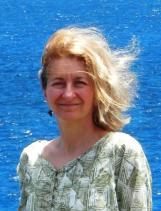“We asked for workers. We got people instead.” Such is the nature of the lives of migrant women in Hong Kong. On March 2, 2015 Nicole Constable, director of anthropology and Asian studies at the University of Pittsburg, visited the Asian Institute to discuss her most recent book, Born Out of Place: Migrant Mothers and International Labour. Her research focuses on a small subset of workers rights for Foreign Domestic workers in Hong Kong – the problems that mothers face when they become pregnant while employed as domestic workers and the immigration struggles they face afterwards.
The book so far has received wide praise and attention, both from academia and the world at large – it was reviewed by newspapers in Asia as well as in the United States, something that is unusual for an academic work, and which has not happened previously with Constable’s works. This media attention led her to question the role of anthropology in affecting public discourse, as well as the specific impacts that her book had on the community that she worked with. Within the community, her book had significant effects on the NGO she worked with, Pathfinders Hong Kong, which provides legal resources and aid to migrant mothers. However, it also had the potential effect of exposing several aspects of their lives that would have negative ramifications (for example, the loopholes the women used to remain living in Hong Kong). It appears that researchers can face a balancing act between ensuring the accuracy of their reporting and managing the potential ramifications of their research.
The stories of the women she worked with are thought-provoking and lead to many questions about the growing role of foreign workers in Asia. Throughout her study, Constable worked with about 55 mothers and their children, a small representation of the many mothers that get pregnant as workers in Hong Kong. As foreign domestic workers (almost all from Indonesia or Philippines), they work from contract to contract that they sign with one of the many employment agencies that hire them out to a variety of foreign jobs, from housekeeping to factory working. Should the women be fired, they have two weeks to either land another contract or move back home. Immigration is a major issue for FDWs, who may still owe hundreds of dollars to the agencies that hire them at the time of their termination, and in the case of these mothers, who are pregnant or have young children and cannot return home without facing consequences from their families or the fathers.
According to Constable, women have several possible paths after immigration that allow for different outcomes. The most secure (privileged) outcome is for the women to obtain legal residency by marrying a resident. However, they also employ many other tactics to remain in Hong Kong, primarily by filing for asylum or making a torture claim, both of which can take years to be denied between the many appeals processes. This way, they can maintain their lives in Hong Kong for a number of years. Constable mentioned cases that, from the time of the woman’s pregnancy, took years to fully play out, and some of the children were in double digits before they either obtained legal residency or were sent home.
Constable’s research on this specific issue sheds light on the everyday struggles that affect many FDWs in Southeast Asia. The agencies that hire FDWs out often charge them exorbitant rates, which they may not have paid in full by the end of their contract. Most important is the conception of FDWs as simply employees. Many of the expectations and legislation that affects the workers does not account for any activities outside of work. Women are not expected to become pregnant in large part because their employers don’t consider that they might have a life outside of work.
Constable’s work in this area is not finished. Instead, she is embarking on yet another research project that intersects with the stories of the migrant mothers. One of the women she interviewed was briefly imprisoned at a correctional facility called Lo Wu for immigration evasion. During her time there, she had access to prenatal care and health services and was able to work for money. As an over-stayer, life there was better than outside prison. Worldwide, Lo Wu is known as one of the most sophisticated correctional institutions, attracting both criticism and praise for the teaching programs and facilities that it provides for its inmates. It is an especially strange phenomenon that migrant mothers without legal status can find a safer lifestyle in prison than outside? This, according to Constable, seems representative of the dichotomous laws of Hong Kong as a whole – a place with a variety of influences that is equal parts progressive and conservative. This is also seen in the public views of the prison – some see it as an excellent way to allow inmates to make lasting changes in their lives, while others criticize it as too lenient.
-written by Rachel Ball-Jones, a second year student double majoring in political science and peace, conflict, and justice studies at the University of Toronto
This article is part of a series of articles written by undergraduate students affiliated with the Asian Institute about events hosted by the Asian Institute.
